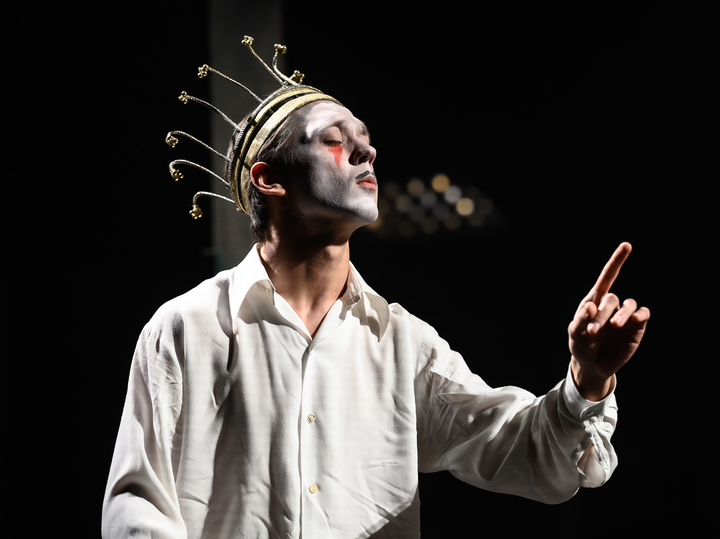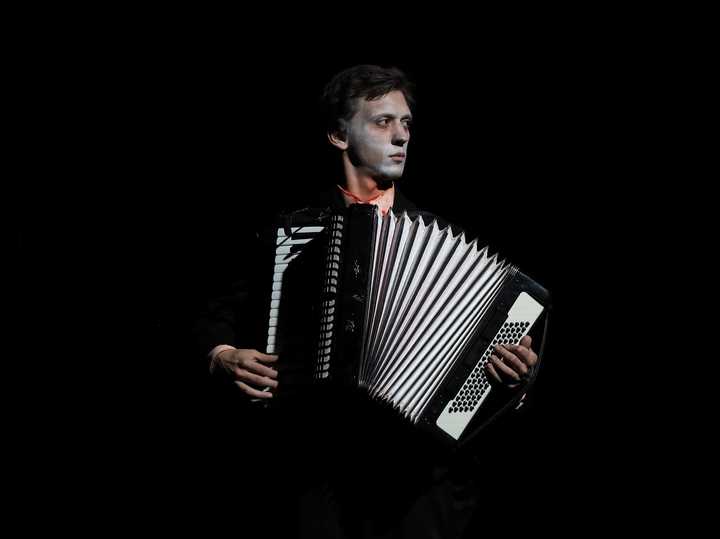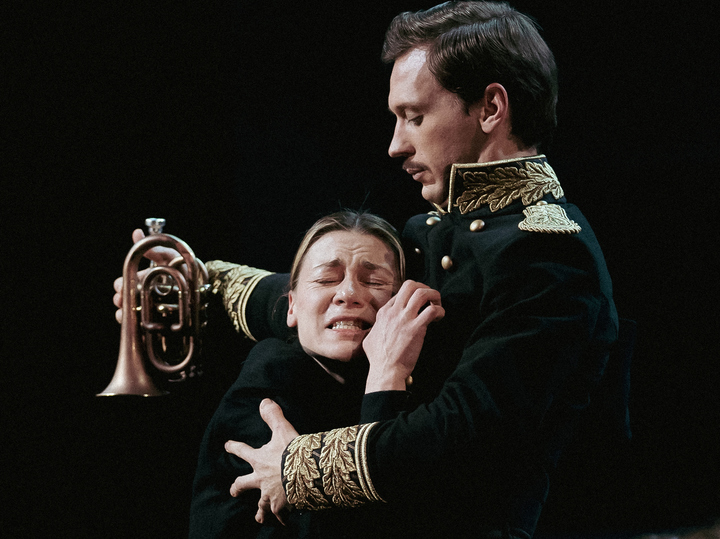Yuri Tsokurov: “Everything was in full swing at War and Peace”
[ad_1]
“On March 8, the girls forgave me everything”
– Yura, is it true that at one time you entered the top ten best accordion players in Russia?
– True, I was seventeen years old, but actually it all started earlier, as a child, when at some point I began to sing in the streets.
– That is?
“I just walked down the street and sang songs. And then my parents sent me to the choir. Well, I sang and sang there, but they didn’t give me an instrument, because the button accordion is big, and I’m small, frail. And only later, when he moved to another school, he began to master the accordion.
– A guy with an accordion or a guitar is a guaranteed success for girls!
– Still, after all, in the music school in the class I was the only guy for three years, and this is the fifth, sixth, seventh grade – the very formation. Something was going on with something on February 23 – up to the ears of gifts, but on March 8 the girls forgave me everything. Thanks to these three years, I understood a lot – it was a school. I remember I fell in love with some girl: I sat and turned around all the time, looked at her, caught myself that the whole class was laughing at me. Realizing this, he looked anyway, he could not take his eyes off. But still, he began to take control of himself, to grow up, to understand his feelings. But music… it can express everything. Well, over the years I realized: there is a difference between how they perceive me before and after singing. As I sing, I see that the eyes of the girls somehow stop.
– Do you use it?
– Not only do I take …
– And yet – why an accordion, and not a violin or a cello?
– I’m from the Kuban, and there everything is tied to folklore. Born in St. Petersburg, but spent all his childhood in Anapa, and then in Krasnodar. My parents met in St. Petersburg (my mother is from Belarus, and my father is from Siberia), but since my father always dreamed of living by the sea, when I was born, they went to the Black Sea to fulfill their dreams. There I grew up. And the accordion … It is a self-sufficient instrument, you can do everything with it: sing, play accompaniment, instrumental things, play in the orchestra … I was going to enter the conservatory, and if I had not been accepted to the Pike, I would have gone to the conservatory to take exams.
– With such a passion for music and success, why did the acting beginning win music in you? After all, musicians have a different psychology, not the same as that of artists.
– Just today I was thinking about this topic in the context of the fact that I am looking for proof of this all the time and I understand what I want. And it is very important to understand what you want. Maybe then my arguments were as follows: “With the button accordion I will get into the orchestra, and this is not such a popular instrument. If I stay in the Kuban, I get into the Cossack choir, I will go on tour with him – and this is my ceiling for life. And I wanted to take off somewhere – and so there was acting. It seemed to me that one had to work harder there than in music, and therefore I chose the most difficult path for myself. And I also thought that an actor can play on stage, and at the same time – on different instruments, which is what I’m doing now.
Having reasoned this way, I came to Moscow and entered the Pike the first time, although I understood that I always had a way out – the conservatory. I immediately got an audition to Alexander Anatolyevich Koruchekov, and he sent me home, agreeing on the next date of my arrival immediately for the third round, bypassing the second. So I had no choice – I seemed to be led.

“Two years ago I got a rock band”
How many instruments do you own today?
– A lot – guitar, balalaika, domra, button accordion, accordion, tambourine. I play bass and harmonica. When I was accepted into Pike, Alexander Anatolyevich said that we should master some instrument over the summer, and I mastered the saxophone in two months. And now for the play “Lear” (director Y. Butusov. — M.R.) mastered the pipe in three months. And in “War and Peace” I also play the trumpet. True, it is slightly smaller than in the “Lear”, it is called pocket. I easily master the instrument – I have a penchant for this.
– Do you compose music?
– Yes. I introduce a composition into each performance: in “Peer Gynt” Yana Sobolevskaya sings my song, in “War and Peace” the three of us sing my romance – me, Masha Volkova and Olya Lerman … I can’t say that music helps me out, but, in fact, firstly, she is always there, and secondly, I myself involuntarily return to her. Two years ago, I got a rock band, they released an album, now we are recording the second one. But there is modern electronic guitar music. I want to try a new sound, not folk or classical.
– There is no conflict between the musician and the actor inside you?
It doesn’t happen, I’m surprised. So I think: “It’s time to decide,” and then: “Yes, it seems that it’s not necessary.” I am doing what needs to be done now. Here was the release of War and Peace – I gave myself completely to the release, put the harmonica aside, and nothing interfered with me. And the “War and Peace” ended – he began to write music, in six months he composed an album.
We, the actors, are dependent: whether they will be called to work or not, how the repertoire will develop in the season, how many performances there will be, whether you will pass the screen tests … And here I have complete carte blanche, I can create in my free time myself. It’s all about creativity. Probably, this is the property of a person – to think about the finiteness of life, and hence the desire to create something, to leave something behind. And it can be anything: pottery, car assembly … And someone sits down and writes, but it’s definitely not me.
– It seems to me that in the most difficult time you, unlike others, will not disappear: with an accordion or a balalaika you will always earn a living.
– You know, in my life I feel a sense of security – it seems to have been with me since birth. It is there, and over the years I only kept it, improved it, honed it for many hours of playing the instruments. And it will always be with me.
– Do you perceive life as music?
– Life emotions then somehow pour into music. But I still can’t hear the polyphony of life.

“I was smartly in love”
– In “War and Peace” – today the loudest performance in Moscow – you play not just Nikolai Rostov, but two completely different Nikolaev. More precisely, two different states of one person.
– Yes, at first I play a happy child, and this is happiness. During rehearsals, I listened to Mozart concertos. Instrumental music, not vocal, so as not to overwork the ligaments. Perhaps the role of Nikolka is a continuation of my Peter Pan. She is like a dream, like a flight. It is about childhood, about happiness, which breaks down in the end. He tramples on reality, breaks down on the word “must”, on laws, politics … Maybe my Nikolka and the stupid child who in the first acts raves about fame and who wants everyone to look at him, everyone to love him – this is understandable. But in the third act, he becomes completely different.
– The problems of early growing up should be clear to you: in the 90s, many of your generation were knocked out – some by crime, others by drugs, parental unemployment, poverty in small Russian towns …
“Maybe I’m a happy person. Thanks to my parents, I didn’t notice any of this. I am the second child of my mother, and the only and late of my father. If dad is a rational person, a programmer with a degree in mathematics, then mom is a torpedo, all in emotions. So all I have is the love of my parents.
I was loved by my father, and smartly loved. Dad was strict with me, very strict. And I even once said to my mother: “Dad is strict with me.” “He is strict with you, and when you are not there, he sheds a tear and does everything for you,” my mother answered me then. In fact, my father sacrificed a lot for me, in fact, he gave everything to me.
– In the second part of the play “War and Peace”, your Nikolka smelled of gunpowder and learned the true price of life and death. But you didn’t serve in the army either…
For some reason, I immediately felt my final monologue. It’s not only about shooting and explosions – it’s about the Motherland, about the victim, about defeat, victory, about the desire to protect the family. And all this in one person. These are our Russian motives. As a person with an accordion, I have been singing these songs all my life, and they connect me with Nikolka in the finale. He is the soldier who is for all the soldiers. For all our Russian soldiers.
“Did you ever think that you could become such a soldier?”
– Of course. And I would be proud to be something like that. As they say: the best die in war and the most desperate and courageous go forward. I feel that the desire to protect lives in me. War is scary, it’s bad. But we have the theme of Russian officers, Russian glory, valor, and it is very strong in me, especially when it comes to the events of the 19th century. The glory of the Russian people and troops, about which Nikolka utters the words at the end of the performance: “The military leader will still try to hide his mistakes, but this will not succeed. It will not be possible to belittle the glory of the Russian people and troops.

“In fundamental things, I decided for myself”
– You started rehearsing War and Peace a few months before the special military operation began. And no one then knew that hostilities would take place. Are these feelings included in your monologue?
– The performance was played the next day after the start of the SVO. And the day before we had “Lear”, where I have such a sonnet: “To the plague, to the fire, to famine, to war – I don’t know, to bad weather or to the weather …” And the next day – “War and Peace” . And everything on the stage was seething and arguing with what was around. I got goosebumps…
This is the genius of Rimas Tuminas – as if to foresee everything and stage a performance about it in advance. And when I read a monologue on stage, I myself felt how it grew, increased and went further. It became so ringing. And not even a theater, but a conversation with a huge and hushed hall. The fourth wall is being broken: we understand what we are talking about with our performance. This is about what is happening now and will always happen. And my monologue is a peak not only for my hero, but also for me. It is for today.
– In connection with the ongoing events in society, and especially in the creative environment, I observe a split – there is no unity. Does the patriotic theme that you grew up on help you personally determine your personal position and cope with the situation?
– Honestly, at first there was a moment of some kind of despair, but then I determined something for myself: I will not leave the country, I loved and love the people around … And, of course, work saves me: I have music, theater. I began to compose, trying to understand the sound of what is happening around. You can’t stop, you have to move on. If it’s hard, then you need to move on with more effort. This is what life is about. I have decided on fundamental things for myself, and they are generally unchanged: the most important thing is human life, it is important to be free and do what you love. Everything else is transitory. Then you understand who you are and why you are doing it.
Everything is in our hands, we can do everything ourselves. Even if little depends on you, it is better to formulate for yourself what depends. And that not the other person is wrong, but that you can behave in such a way that a person will change. And do not blame anyone, do not wait, but take everything into your own hands. And not only for yourself, but you can make the world a better place and people around you happier.
How happy am I? I don’t know. Question: what is happiness? You can read Tolstoy and find a couple of answers from him. But that’s the whole point – he himself did not know the answers, he himself said with each of his next entries in his diaries: “I was wrong” – and was in search. Maybe happiness is in the search? ..
[ad_2]
Source link






